Are you in Syria? Share your stories, videos and photos with the world on CNN iReport. Northern Syria (CNN) -- Rebels captured a government military base Monday on the outskirts of Aleppo, the hotly contested Syrian metropolis that has seen more than a week of bloody clashes. The base had about 200 Syrian troops and appeared to be under attack by rebels from three sides overnight. "The battle lasted around nine hours," said Fazad Abdel Nasr, a rebel commander working in the northern Aleppo suburbs. Nasr said six regime soldiers and four rebel fighters were killed. The rebels also gained heavy equipment to supplement the lesser weapons they had been fighting with. "We captured four tanks in good condition, and they are now in the hands of the Free Syrian Army. Two were destroyed," Nasr added. Despite the boost for the rebels, the relentless battle for Syria's largest city raged on Monday. Al Jazeera correspondent Omar Khashram was wounded during heavy fighting in a central Aleppo neighborhood. Khashram, who was being treated in a hospital in Turkey, told CNN shrapnel from a shell penetrated gaps in his flak jacket in Aleppo's Salahuddin neighborhood. U.N. observers have reported a surge in violence in Aleppo, with helicopters, tanks and artillery being used, mission head Lt. Gen. Babacar Gaye said Monday. Regime forces launched missiles and shelled from attack helicopters, opposition activists said. Aleppo, Syria's commercial and cultural hub, has seen a mass exodus amid the violence. About 200,000 people in and around Aleppo have fled shelling and heavy weapon fire in the past two days, Valerie Amos, the U.N.'s under-secretary-general for humanitarian affairs, said Sunday. Conflicting reports emerged Monday on who controlled the major Aleppo neighborhood of Salahuddin, which rebels had claimed days earlier. Both opposition fighters and the regime said Monday they had taken over Salahuddin. At least 17 people were killed across Syria on Monday, including eight in Aleppo, according to the opposition Local Coordination Committees of Syria. With no end to the country's 16-month crisis in sight, French Foreign Minister Laurent Fabius said his country will take more action to try to stop the bloodshed. "As France is taking over the presidency of the U.N. Security Council on August 1, we are going to ask -- before the end of the week -- for a meeting of the Security Council, probably at a ministerial level ... to try and stop the massacres and prepare for the political transition," Fabius told French RTL radio on Monday. Video: The changing mission of U.N. in Syria Also on Monday, a Syrian brigadier general -- who is also a deputy police chief of Latakia -- defected to Turkey, the Turkish Foreign Ministry said. An additional 11 Syrian officers also defected overnight, the ministry said. The total number of Syrians who have fled to Turkey has reached 43,500. Meanwhile, fighting words continued between Syrian President Bashar al-Assad's regime and opponents near and far. Syrian Foreign Minister Walid Moallem gave ominous words Sunday about the battle for Aleppo, vowing that rebels would not gain control of the city. "Since last week, (opposition fighters) planned for whatever they called the 'great Damascus battle,' but they have failed after one week," Moallem said, referring to a rebel offensive beaten back earlier this month. "That's why they moved to Aleppo, and I can assure you that they will fail." He made his comments during a trip to Iran, one of his nation's few remaining allies. But U.S. Defense Secretary Leon Panetta predicted Sunday that the Syrian regime's violent crackdown in Aleppo will prove "a nail in Assad's coffin" by turning even more people against al-Assad and his government. Nabil Elaraby, the head of the Arab League, said Sunday that the league believes war crimes are being committed in the city. Blog: A bloody mess could get messier At least 114 people were killed across Syria on Sunday, according to the LCC; 11 of the dead were from Aleppo. Elsewhere, 41 people were killed in Damascus and its suburbs, including 18 people whose bodies were found charred on farms in Moadamiyeh, the LCC said. Syrian TV reported that "terrorists" suffered heavy losses after clashes in three Aleppo neighborhoods. With reports of incessant attacks rocking Aleppo, the head of a prominent Syrian opposition group pleaded for world allies to help arm rebels. "Our friends and allies will bear responsibility for the terrifying massacres that will happen in Aleppo if they don't move soon," Abdulbaset Sieda, head of the Syrian National Council, said Saturday. Read more: Syria rebels appear more capable, yet still outgunned He urged allies to act outside of the U.N. Security Council, as resolutions there can be vetoed. "The rebels now are fighting with primitive types of weapons against the killing machine," Sieda said. "We need weapons that will allow us to stop tanks and planes." Iran's foreign minister, meanwhile, accused Israel of being behind "a conspiracy against Syria" and gave a warning to the international community. "It is completely ridiculous and delusive to believe that there is a possibility of creating a vacuum in the leadership in Syria," Iranian Foreign Minister Ali Akbar Salehi said. "We call upon the people of the region to be fully aware and not to move in the wrong direction, because there will be severe consequences that will go beyond the borders of the region to the outside world." The Syrian crisis started in March 2011, after al-Assad's regime violently cracked down on peaceful protests seeking his ouster. The Assad family has ruled Syria for more than four decades. More than 20,000 people, mostly civilians, have died in the conflict, the LCC said. Last week, U.N. Secretary-General Ban Ki-moon said almost 17,000 people have died. Read more: After the fall of the House of Assad, could Syria be worse? http://edition.cnn.com/2012/07/30/world/meast/syria-unrest/?hpt=hp_t1Syrian rebels seize military base outside Aleppo
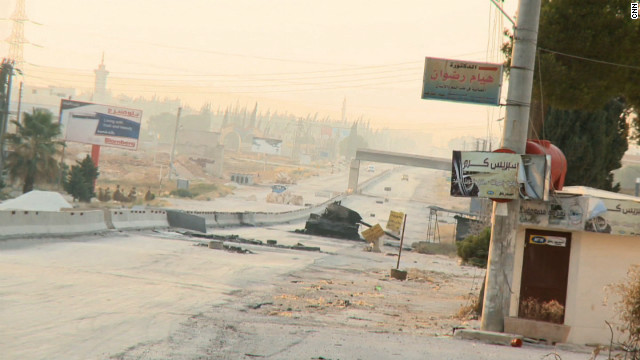
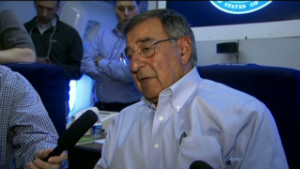 Panetta: U.S. 'closely monitoring' Syria
Panetta: U.S. 'closely monitoring' Syria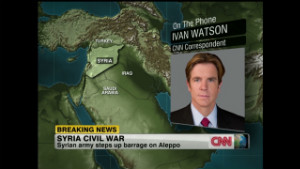 Rebels attack Syrian base near Aleppo
Rebels attack Syrian base near Aleppo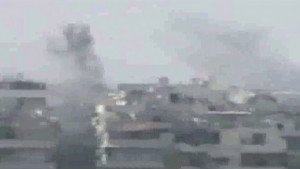 Thousands flee Aleppo, Syria
Thousands flee Aleppo, Syria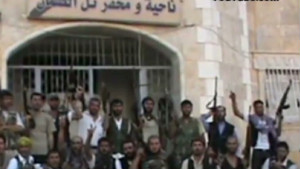 Syria rebels: We took police station
Syria rebels: We took police station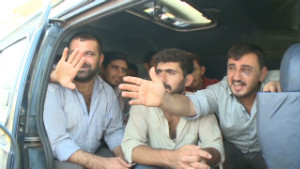 Watch a prisoner exchange in Syria
Watch a prisoner exchange in Syria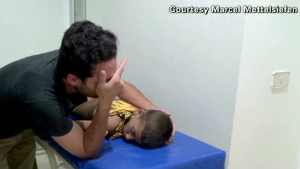 Rastan: Shattered city in Syria
Rastan: Shattered city in Syria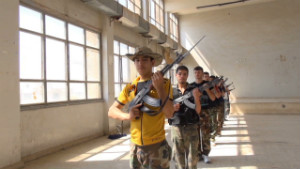 Filmmaker documents violence in Syria
Filmmaker documents violence in Syria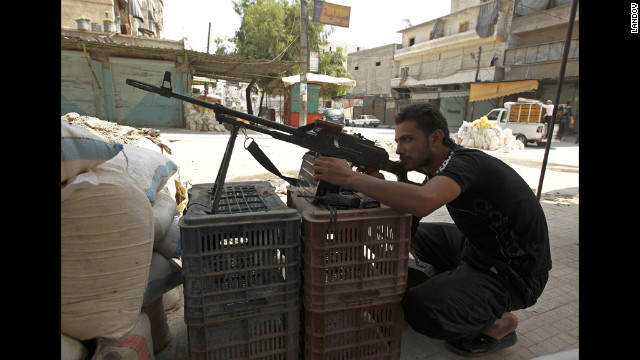 Showdown in Syria
Showdown in Syria
Monday, 30 July 2012
July 30, 2012 -- Updated 1253 GMT (2053 HKT)
STORY HIGHLIGHTS
Posted by
Britannia Radio
at
19:58
![]()





















